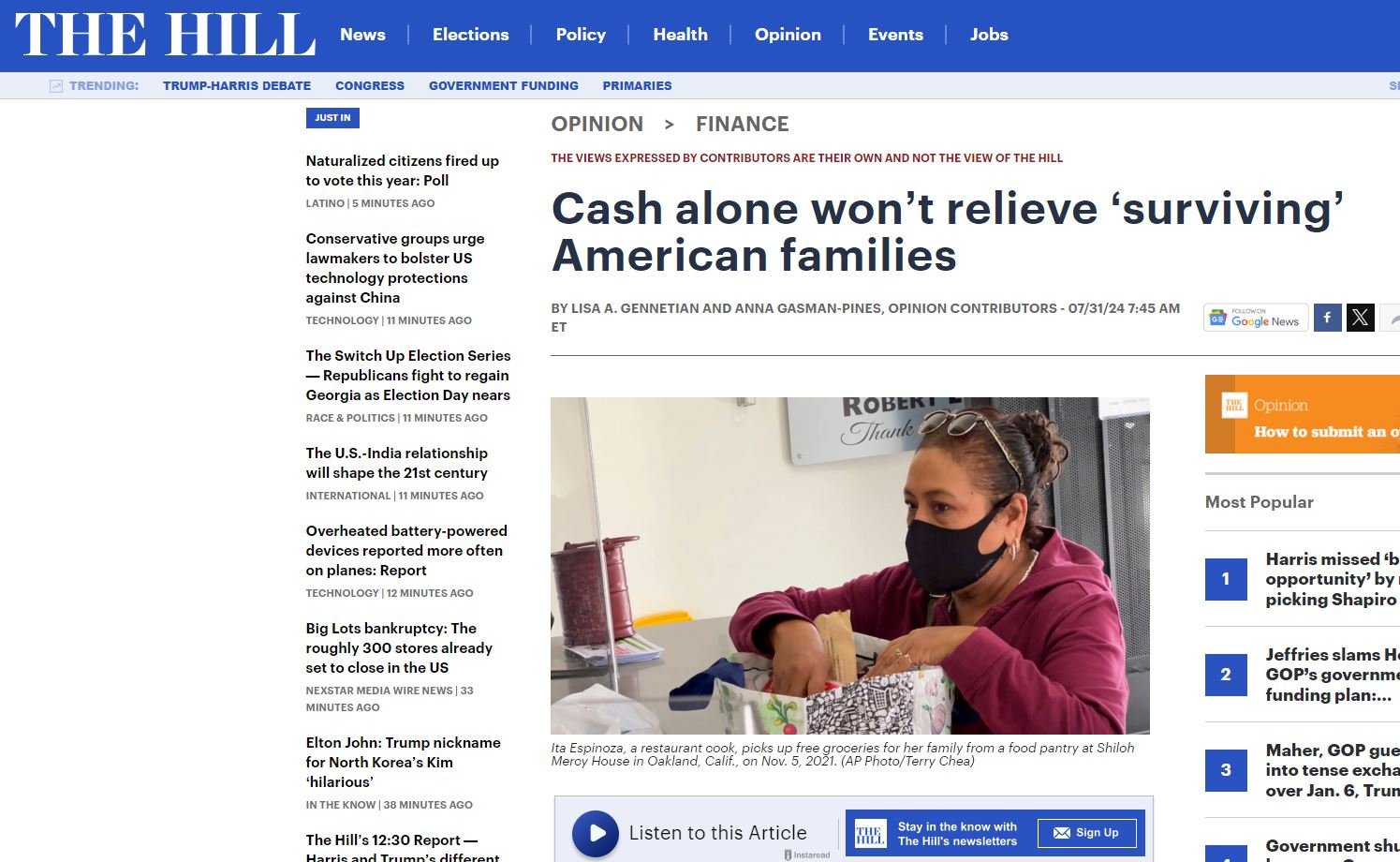Public Engagement
Media Highlights
In this episode, I draw on my work to provide an overview of cash assistance programs both in the US and in other countries, with a particular focus on programs aimed at families with children. IRP, April 23, 2025.
The 2021 expansion of the child tax credit succeeded in its goal of providing financial relief for families with children. What were its effects on parental stress and psychological well-being? It’s complicated, as Dr. Gasman-Pines and I describe here. The Hill, July 31, 2024
The title says it all: “Why Does the Richest Country in the World Have So Many Poor Children?” I help explain why, and what we can do about it. Freakonomics, September 15, 2021
I talk with Marketplace about the ambitious nature of the family tax credit expansion in 2021’s American Rescue Plan. Marketplace, May 18, 2021
I explain how the “refundable” setup of the 2021 tax credits—sending monthly payments to families in advance of tax season—has a huge impact for families in poverty. People, March 16, 2021
For low-income moms, the monthly cash payment in the Baby’s First Years study could be life-changing. As one of the study’s lead researchers, I illuminate how a reliable income source can help parents support their children’s development and plan for the future. MarketWatch, May 12, 2019
In My Own Words
@Econofact
The Financial and Psychological Costs of Income Volatility“The financial and psychological toll of income volatility can be very high especially for people with low-incomes and their children—who face volatility with the fewest financial buffers or protections. Designing safety net and related income support policies may have bigger returns if they are stable and predictable and can act as economic buffers amidst other sources of macro or labor market uncertainty.”
Economics of Infant Feeding in the U.S. and How Do Low-Income Families Spend Their Money?
“There is government support for spending by families residing in poverty on healthcare, food, utilities and housing… But aid is limited and there are gaps in coverage, which means that many of these families still have out-of-pocket costs to cover basic categories.”
Many Families With Children Experience a “Hidden” Source of Poverty
“Policy attention should be paid to both income and net worth poverty. Children who are net worth poor, but not income poor, have been overlooked but may nevertheless be a vulnerable group.”
Work-based Risks to Latino Workers and their Families From COVID-19 and Challenges of Equitable Rapid Response Cash Payments
“The economic shock of COVID-19 is not going to be even handed: low skilled, low income, and income-poor families with children are all going to be hit harder than everyone else. Cash transfers could help these people during this very challenging time, especially those who have little or no savings and who are already in precarious economic circumstances. But it is important that these transfers reach everyone, including the most vulnerable.” Read more here or here.
@Brookings
“The expanded child tax credit proposed under the Biden American Rescue Plan is the largest single anti-poverty investment in children since the introduction of Head Start to over half a million families in the summer of 1965… However, these policy investments in isolation may not reach their full impact without also addressing the long-standing racial disparities of structural racism—some of which contributed to child poverty in the first place.” Read more here or here.
“Economists have strong tools at their disposal to tackle thorny policy issues. Simplifying their argument into false dichotomies, however, does not pave the road to increased progress on the enduring challenges of social mobility. Instead, we need to apply broader models that consider smart investments throughout children’s development, including adolescence, and that adapt to the reality of household poverty and food insecurity.” Read more here or here.
“All American families, rich or poor, are facing economic uncertainty. In the best of cases, such economic uncertainty will be short-lived with manageable health consequences; but for the 16 percent of children growing up in poverty (one in six children), the economic shock of COVID-19 might never be recoverable. A generation of children—including the millions who will be born in 2020—will be at risk…” Read more here or here.





